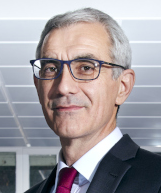CERN’s Finance and Human Resources sector is not short of issues to be tackled, and the Member States have many expectations. How can CERN bring even greater added value to its members, to the benefit of the international scientific community and of individual countries, so that each feels comfortable that the major resources invested in CERN benefit society equally, in both the short and the long term? This is the constant collective challenge on which the sector is focusing its efforts.
This simple objective can be broken down into a whole series of actions being taken by the departments of the Finance and Human Resources sector. To give just a few examples: retaining and recruiting the best talent on the market; securing a diverse range of nationalities, genders and profiles; making the Organization more efficient, less bureaucratic and less costly; prioritising, which means both devoting more resources to the most important projects and postponing or even giving up others; working towards a “well-balanced” return , in the widest sense, for every Member State; giving renewed impetus to technological innovation to meet CERN’s specific needs and promoting the spread of such innovation in society at large; becoming even more exemplary in order to reduce CERN’s environmental footprint; completing the HL-LHC works and conducting a study of the feasibility of the civil engineering aspects of the FCC in order to facilitate the decision that will be taken after 2025 on the projects that will determine CERN’s future; developing collaboration with the European Union, particularly as part of the Horizon Europe programme and, in the longer term, preparing to welcome the European Commission as a funding partner for our major future projects.
These specific objectives come on top of the daily work that already occupies all the teams in the Finance and Human Resources sector, who are working to ensure that CERN remains an exemplary, efficient and – above all – pleasant environment for all those who work, think and live on the campus.
My previous experience has encompassed exciting roles, mainly in the public sector, in France, Brussels and London and in some developing countries, in the field of European and international affairs, and in the financing of some major, iconic projects and cooperation programmes. Taking what I’ve learned elsewhere, I hope to contribute, however modestly, to CERN. I am very honoured to be joining this Organization, and I am especially enthusiastic about the prospect of working with such talented and experienced teams.
The first two years of this five-year term of office will be particularly crucial for guiding and shaping CERN’s practices with a view to achieving the strategic objectives set out by the Directorate. I am committed to making a personal contribution to these objectives by acting with determination and making concrete and tangible progress. I am also, of course, counting on the teamwork of the Finance and Human Resources sector as a whole, and on the individual and collective efforts of all our colleagues across the Organization.

